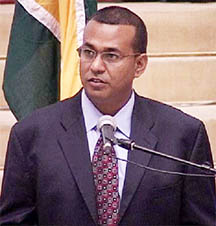Minister of Natural Re-sources and the Environment Robert Persaud yesterday warned that the stalled passing of amendments to anti-money laundering laws will affect the mining sector, even as it is producing more gold.
“The reality is that miners themselves would have already indicated that they are fearful that should Guyana be blacklisted and if we don’t have the legislation passed by the National Assembly which would give us close to 95% compliance…it would affect transactions; transactions between local banks and international banks,” the minister said at a press conference yesterday.
Following the failure of the National Assembly to pass the amendments after the parties could not reach consensus in May, Guyana was required to submit documents detailing progress made on implementing the Anti-Money Laundering Countering the Financing of Terrorism (AML/CFT) Amendment Bill by August 26. Government made a submission to the Caribbean Financial Action Task Force (CFATF) but was unable to report that the legislative component of the body’s recommendations had been implemented, Attorney-General Anil Nandlall recently said. Guyana’s progress is again set to be reviewed in November.

Yesterday, Persaud said miners are concerned at the stalled legislation. He said Nandlall has pointed out that there is some level of uncertainty as to how it will affect the mining sector and miners are fearful that Guyana could be blacklisted and transactions between local and international banks could be affected.
According to Persaud, if, for example, a miner wants to recapitalise, buy spares and do legitimate transfers from Guyana to corresponding banks out of the country, “with Guyana being blacklisted, that can affect the transaction.” He said that it would be up to the discretion of those banks as to how they treat Guyanese banking institutions. The minister noted that foreign investors such as the large companies in the mining, forestry and other sectors may source equipment and supplies and require this type of transaction with international financial institutions “and if we are blacklisted, what it means is that we can see some interruptions, some delays and even some transactions being affected.
“It is a concern to the investors within the extractive industry and a concern to miners and operators because they want Guyana not to be blacklisted because it is bad for business, it is bad to the country’s economy as a whole and they see themselves at the individual level how it is they can be affected,” the minister said.
“We do hope that the opposition themselves would recognise the potential economic damage, not only (to) the image of the country but the economic damage and the disruption that this can cause to a number of activities if we do not have the relevant amendments to the Anti-money Laundering and Countering of the Financing of Terrorism [Act] because this is a very crucial piece of legislation and it will affect a lot of the day to day transactions.”
He added that the mining sector has expressed concern about the potential harm and danger this can cause.
Meantime, Persaud also disclosed that gold production to date is higher than the corresponding period last year and said the country will be seeking new markets for the precious mineral. To date, 353 000 ounces of gold has been declared.
The minister said that the adjustments made by the sector to cope with fluctuating gold prices in terms of managing costs are commendable and pledged that his ministry will continue to stay engaged because gold is important to the economy.
He also disclosed that they will be looking at new markets “so that we can get better prices, premium prices” for gold
Traditionally, gold is exported to Canada but dealers also export to Dubai and the US. Persaud said that they are looking at tapping into the growing and special demand of the Indian and Chinese market and the ministry would be reaching out in the coming months to both government and private sector entities in an effort to get premium prices for the precious mineral.





